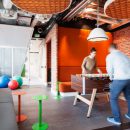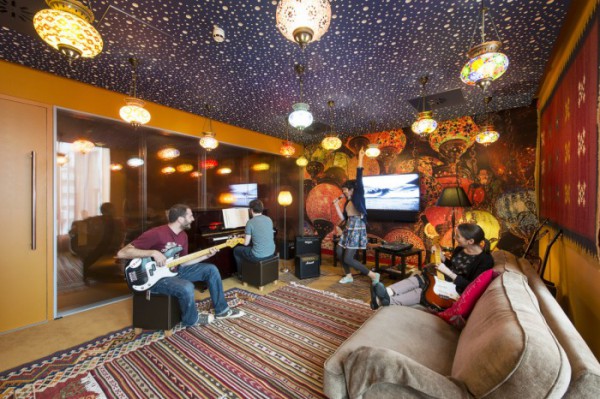
Should Offices be ‘Fun’?
“Of course they should”, responds the modern entrepreneur, inspired as they are by the tales of Google’s London headquarters, with its themed meeting rooms and rooftop allotments; by the news of Lego’s flexible work zones, with no allocated seating and absent manager’s offices; by the music room of LinkedIn’s California HQ, where employees can relax with their hundredth impromptu riff of Smoke on the Water. “Of course they should.”
The demands of the average worker to maintain a suitable work/life balance are increasing, and companies, it seems, are embracing this idea with some increasingly whimsical office features. It’s a surprising trend; the immediate assumption of a company headquarters is a buffet of suit jackets, briefcases, and cigar-chomping moguls shaking hands in whitewashed offices. Crazy Tie Friday is about as outlandish as those guys get. Yet business leaders, tackling the stereotype, are coming around to the idea of offices being more leisurely than laborious.
The rise of the ‘fun’ office isn’t some bourgeois trend though, nor is it indicative of more and more startups becoming less worthy of being taken seriously. It’s actually a reflection on the great many ways that the business world is adapting.
Technology is evolving to the extent that the impending “Internet of Things” will unite our electrical goods into a single, harmonious interface, allowing our appliances to talk to one another in a way not witnessed since The Brave Little Toaster. Given how much of our media and technology is equal parts digital and physical formats (when was the last time you spun a CD as opposed to an MP3?), future business decisions will hinge imperatively on the ideas of their entrepreneurs. Our current generation will give way to a more youthful population, their eyes more keenly focused on technological, pop-cultural trends.

The term for such people (adopted disparagingly by some cynics) is the ‘millennials’ – quite apt, given that their fore-bearers wouldn’t dream of an office ball-pit in a thousand years. Though its more spiteful meaning conjures images of haughty trend-setters clogging up pub gardens with their artisan gin-sipping, the “Millennial” moniker is also poignantly far-reaching, given the landmark era they’re set to adopt.
Still – why do they need an office with a waterslide?
Creative thinking doesn’t exactly necessitate these luxuries, but their presence most certainly aids the creative mind. Imaginations don’t exactly prosper in a cell, far less get acted upon – but a more vivacious working environment at least gets the synapses firing on all cylinders, inspiring and motivating.
Yet there may be deeper reasons behind this kind of work ethic, which again may have a lot to do with the current trends of technology. By the time our next generation rolls around, it’s not unreasonable to believe that all ages will be connected effortlessly via internet technology. This potentially puts a great impetus, if not a responsibility, on companies to exude a safer, friendlier corporate presence. Social networking, for example, is a powerful corporate tool, but it demands a more intimate, inter-personal approach than traditional advertising. The ‘friendly’ workplace might come across as a little fey, but it creates an amicable brand image in a time where internet safety is a growing concern, and companies face mounting scrutiny – if not boycotts – when expressing a minor political leaning online.
The fun, friendly corporate office is still relatively radical, but is proven popular with both consumers and employers. A quick web search for “Best Offices” will turn up a number of articles drawing positive attention towards brands such as Google, the aforementioned Lego offices, Blizzard/Activision; companies with strong tech presences and brand recognition that starts from a young age. Workers want to work there, and customers want to believe that their product was created with misty-eyed whimsy; the same way Charlie Bucket beheld a certain, eccentric chocolate mogul. It is, technically, a form of advertising.

Matthew Cooper, Business Development Director at Woodhouse Workspace, recently penned an opinion piece on the rise of the modern office space: in it, he recognises the influence of the new office ethic, but also warns of its potential to exclude:
“Modernity and forward thinking are often traits companies wish to have attributed to their corporate culture, however as Nichola Gillen, global practice lead of strategy at AECOM recently highlighted on PropertyWeek.com, the increasing diversity amongst modern workforces must be accounted for when considering an office refurbishment.
Focusing an office design on Generation-Y might seem like the way forward, however as these millennials could be up to five decades younger than colleagues working in the same firm, the risk of alienation is real.
A focus on flexibility allowing for different working styles is key to ensuring staff have the opportunity to take responsibility for the ways in which they work most effectively. Desk-sharing and providing collective work areas can offer this flexibility which provides opportunities for improved collaboration and knowledge sharing, leading to higher levels of productivity and staff satisfaction.”
Even if the modern office creates a brand new quality-of-life solution for the workplace, a drastic upheaval of the conventional office might in fact have the opposite effect; creating unfamiliarity that might leave the stalwart worker feeling unwelcome despite their dedication.
So, let us not denounce the importance of the reserved workplace, where precision cannot be distracted with playfulness, routine not broken with recreation, nor authority met with audacity. There still exist those professions where experience means more, where methods were improved upon from lessons only experience can teach.
For a great many, work does not breed harmony without order; and for those with busy home or personal lives, it might even be a source of respite. Yet it might be drastic to dismiss the modern workplace as a crude joke of professionalism; so long as it is applied responsibly, it gives workers a choice of working environments where before, arguably, there was none.
Check out this blog from 2015 if you want to see some of Google’s most awe-inspiring offices – or find out the top things to consider before renting a serviced office.
Thanks go out to Matthew Cooper of Woodhouse Workspace for contributing to this article; find out more about Woodhouse Workspace at their LinkedIn, and if you missed the link earlier, click here to check out their official site.
Save

Thanks for the comment!
I agree with you on a lot of things there, and as with any argument like this I don’t think there’s a ‘right’ approach, so long as it’s approached with moderation. Too stern, or too frivolous an office environment can be equally damaging, the only difference is the reasons why. Thankfully, I work in an office where I feel both work and whimsy are encouraged!
I think offices should be fun but to an extent, the thing is with having too fun of a office is people can get very distracted. But the on the other hand people can refresh there mind every known and again by going entertaining them selves. It gives them the drive to want to go to work in a morning.
Obviously there are many cons and many pros but in conclusion i think the offices shouldn’t be corporate boring offices, where the desks are split up by desk dividers, your not aloud to listen to music or talk. This is a stupid way of working, it brings people down in life. It makes people dread the Mondays.
You want a office where you can have fun, and get on with your work. Let you enjoy your work to keep you motivated and excited for your Monday mornings.